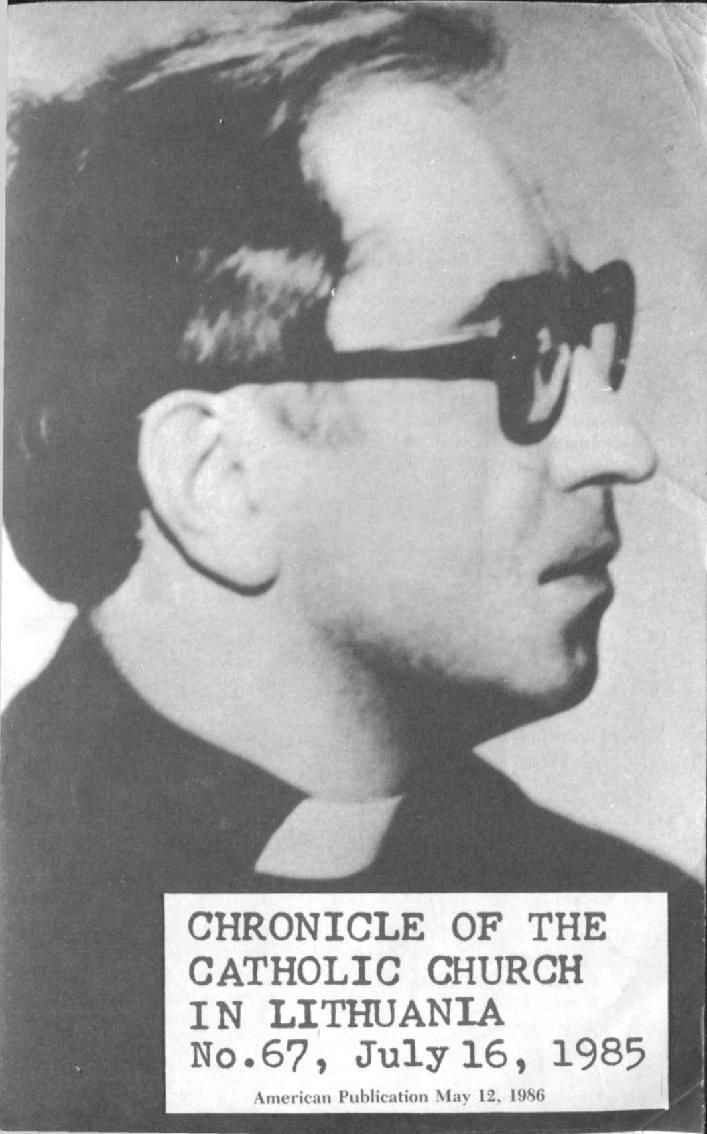
Appearing since 1972 Read this and pass it on! Reproduce it, if you can!
CHRONICLE OF THE CATHOLIC CHURCH IN LITHUANIA, No. 67 
In this issue:
1. Echoes of the Jubilee of Blessed Mykolas Giedraitis
3. A Letter to the Editor of the C h ro n i c l e (Let Us Stop and Think)
4. The KGB Terrorizes Father Jonas Kastytis Matulionis
When we look at the past, at the cradle of Church history, we frequently wonder with reason how such a weak Church left by Christ in the hands of uneducated village fishermen was able to withstand the storms of two millenia, when during the same time, many more clever, more talented, much more powerful empires created by human beings — kingdoms, states, various parties and organizations — crumbled and disappeared without leaving even a trace.
We will not be wrong in affirming that the strength of the Catholic Church on earth — that mustard seed mentioned in the Gospel — is the saints, her sons and daughters who are able to be perfect instruments in the hands of God. This is why Christ left as the cornerstone of His Church not the powerful of that time, but the Apostles, weak in the eyes of the world, with whose names the world holy is inextricably bound up — the holy Apostle Peter, the holy Apostle Paul, etc. The unbroken continuity of the saints in the history of the Church did not end with the Apostles. It was and is still handed on from generation to generation and from nation to nation.
The faithful people of Lithuania thank His Holiness, Pope John Paul II, for honoring fellow countryman Mykolas Giedraitis, in his letter to the participants in the jubilee celebration in Cracow.
We humbly place at the Holy Father's throne our request that our fellow countrymen Mykolas Giedraitis and Archbishop Jurgis Matulaitis, would be proclaimed saints as soon as possible, in keeping with the circumstances.
Catholic Lithuania
(Let Us Stop and Think)
Almost two thousand years age, the greatest betrayal of a man took place. A man betrayed his brother, a sinner his Redeemer, a disciple his teacher, a creature his Creator. The very manner of betrayal, the kiss of Judas, has left us a deep, symbolic meaning for all time. By kissing, one expresses one's love, attachment, gratitude and friendship, one's dedication and joy. The kiss of Judas did not express a single one of these emotions. It was the traitorous kiss of hypocrisy, pride, vanity and envy; and of fallen mankind. It was a repetition of the sin of Adam, when man's pride, fired by envy, could not stand the primacy and greatness of God.
Brothers and sisters in the faith, at a time of penance and recollection, let us look inward, reflecting on our relations with Christ, with our brothers in faith and calling with our nation and our Church. Let us throw open the doors and windows of our soul, and see whether the spirit of Judas does not lurk hidden in the corners of our soul, awaiting the opportunity to overcome and enslave us completely. To Satan, the earthly merits and titles of a person are not important: he is interested in the human soul. His plan is have mankind fall down and worship him, fear him and serve only him. To attain this goal, allmeans are acceptable to Satan.
He comes to us as a friend and companion, protecting us from various mishaps, as the most sincere advisor and helper. He comes as wealth, as high position, and hierarchical advancement. He comes as cold, practical thinking, as so-called wisdom, as fear of losing one's freedom and temporal well-being. Finally, he comes "as a contradic-
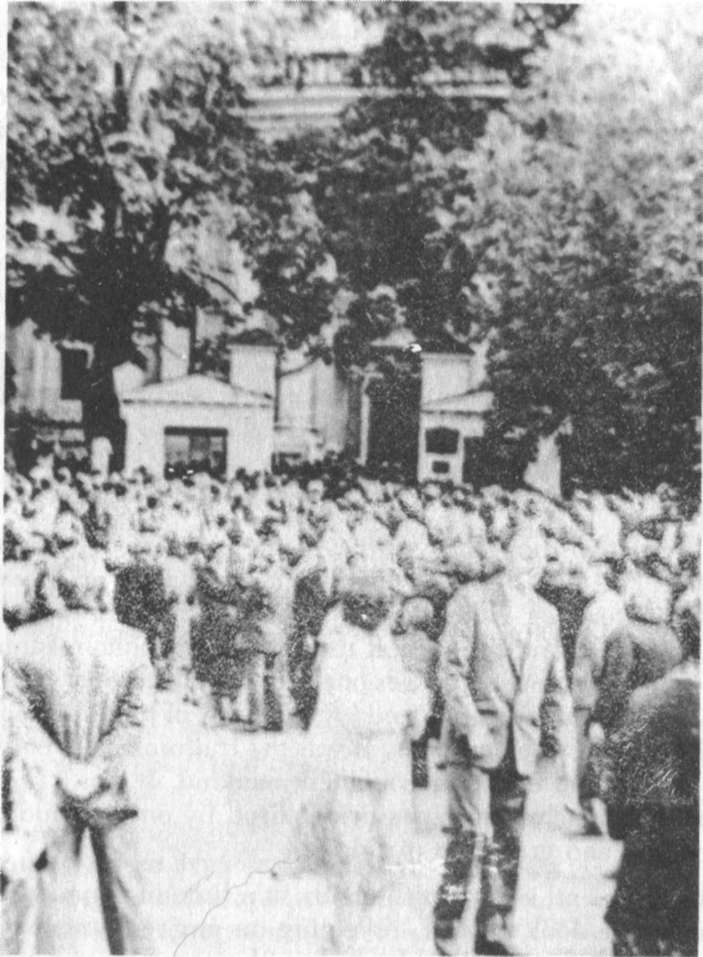
Throngs of people attended the closing ceremonies of the 500th anniversary since the death of St. Casimir, Lithuania's patron saint at SS Peter and Paul's Church on August 26, 1984. Soviet authorities attempted to interrupt a St. Casimir observance earlier that year at which church loudspeakers for thousands of Catholics unable to fit inside the church were turned off on official order.
tion to perceived Truth , as servile submission to evil and complete blindness to goodness and beauty.
Vilnius
On June 19, 1985, Father Jonas Kastytis Matulionis was released from the Smolensk Camp under amnesty. By a happy coincidence that day, in the Church of Saint Michael, Father Stanislovas Valiukėnas was celebrating the fiftieth anniversary of his priesthood. Just before the principal Mass, a worn-out Father Matulionis, who had just returned to Vilnius, entered the church. He had often sung in Saint Michael's Church back in the old days, and was well liked by everyone. Father Matulionis, so recently a prisoner, sang during the solemn Mass, just as he used to. Many of the faithful were surprised: The voice was familiar. . . .FatherMatulionis . . .Butno . . . He is in prison ... It really was he . . .
Since the priest is seriously ill, they certified him in camp for invalid category number one. Besides, the article on which he was sentenced was covered by the amnesty, so they let him go.
After the solemn Mass when many had already left, the former prisoner, father Matulionis, exhausted, emaciated but with a shining countenence, came out to the altar. Approaching the altar, he kissed the ground and, thanking God for the gift of the Faith and the gift of the priesthood, and the people for their prayers, he began to offer
To: The Prosecutor of the Lithuanian SSR From: The Priests of the Archdiocese of Vilnius
A Petition
On January 18, 1985, the Supreme Court of the Lithuanian SSR sentenced Father Jonas Kastytis Matulionis to three years of imprisonment after finding him guilty of severe disruption of the public order, according to Par. 199 of the LSSR Criminal Code.
On the evening of November 1, 1984, Father Jonas Kastytis Matulionis, together with the faithful, went from the church of Kybartai to the nearby cemetery, to pray for the dead. On the day for honoring the dead (All Souls' Day — Trans. Note), throughout Lithuania, even the civil government organizes processions to cemeteries. The faithful, together with the priest under sentence, went to the cemetery in orderly fashion without hindering either traffic or factory work. Hence, there is no basis for considering the procession "severe disruption of the public order". Moreover, even the LSSR Constitution, Art. 48, guarantees freedom of parades along the street.
In March, 1985, the trial of Vladas Lapienis took place in Vilnius. The defendant's wife, Elena Lapieniene was not informed of her husband's trial officially. Having learned of the impending trial on her own and coming to the courtroom, she found it full of people,
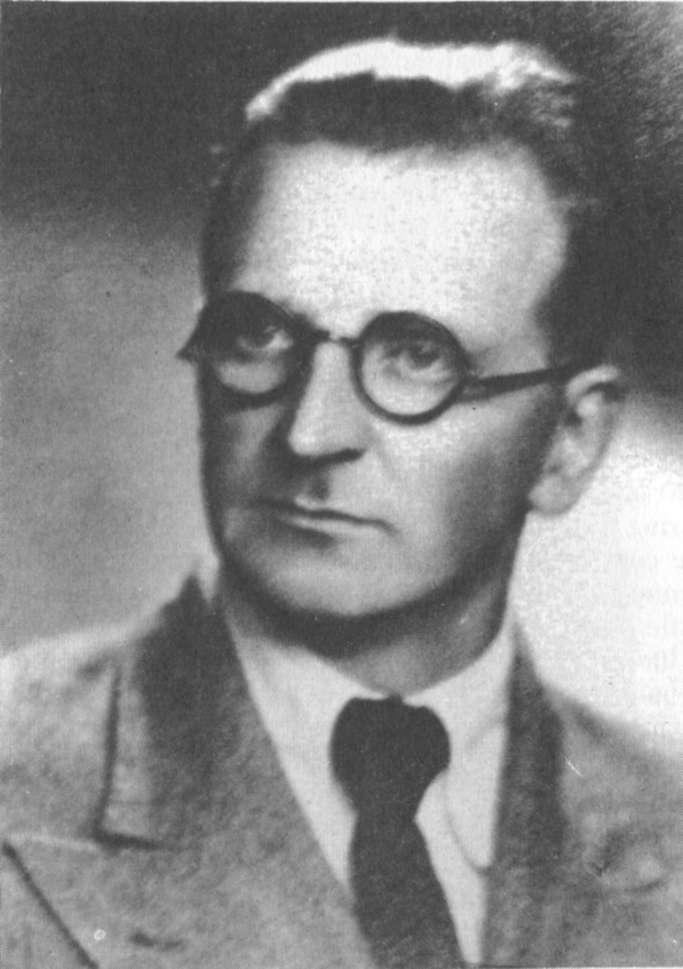
Vladas Lapienis
with no space available. An extra chair was brought for Mrs. Lapie-niene, and placed where the view and hearing would be impaired.
The Prosecutor of the trial was Murauskas; the accused rejected counsel. The trial lasted one day. At the beginning, the evidence, which constituted seven volumes, was read. It was read so quickly and quietly that nothing could be heard in the courtroom. Lapienis was accused of anti-Soviet propaganda and calumny.
On August 1, 1976, the feast of Saint Dominic, the church of Palėvenė (Kupiškis Rayon), celebrated its 300-year jubilee. The sermon on the occasion was preached by Father Pranciškus Masilionis,
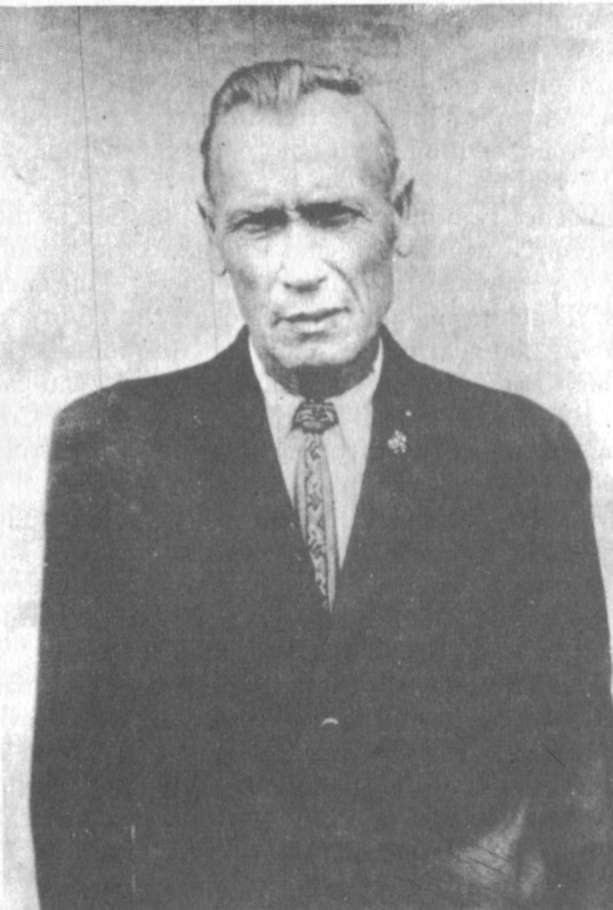
Father Pranciškus Masilionis
who had served at this church. He mentioned briefly the history of the church in Palėvenė; the Dominican Friary founded there, and the school and library they ran, and he described other churches and schools like those of Palėvenė — Pažaislis in Kaunas; SS Peter and Paul, Saint Michael and the Bernardine Church in Vilnius; Tytuvėnai, Linkuva and Kražiai. These were centers of art and learning which had a decisive influence on the formation of the country's attitudes and customs:
"All this prepared the Lithuanians for those struggles and sufferings which awaited them later. All this nourished and strengthened the Lithuanians in their most difficult times. All this encouraged the Lithuanians to hold out and struggle for freedom. All this aroused in Lithuanians feelings of admiration, self-confidence and even a healthy self-esteem. And now, they are treasures of our nation, given to us by on i ancestors, inviting us to hold on to our faith and love of our "fatherland," said Father Masilionis.
Klaipėda
At the beginning of 1985, two men from Klaipėda accused of illegal commerce, Murauskas and Janulis, were arrested. In Gargždai, in private quarters, they had printed holy cards for Christmas and Easter, as souveniers of Baptism, Confirmation and First Communion, and the Way of the Cross sung in Samogitia. The arrested are being held in Vilnius prison.
Sergei Kovalev, back from exile, writes: "... I returned from Magadan in the beginning of December. Within two weeks I was already officially accused by the local militia as an offender against passport regulations, and even as a vagrant, although I never spent three full days at home. Even my wife is a dangerous transgressor of the law — she allowed her unregistered husband to spend the night. I live in Kalinin. The house is in the village. I have my own corner which I take care of, and am in the process of repairing. After much trouble, I have finally obtained employment. For a month now, I have been working as a night watchman at construction sites. My current address is:
170007,
Kalinin oblactnoy,
2-aya Hovozavodskaya ul. dom. 114
Kovalev, Sergei Adomovich
April, 1985
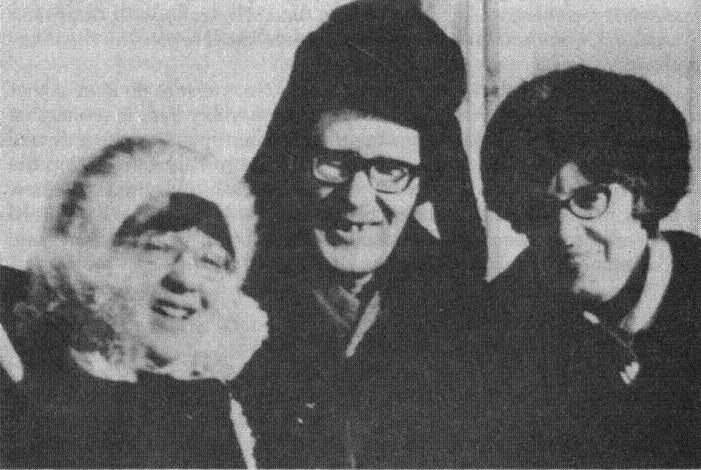
Sergei Kovalev in exile, Magadan region, March 1982, with wife and daughter. He was sentenced in December, 1975, in Vilnius for disseminating the Chronicle of the Catholic Church in Lithuania.
Vilnius
Upon examination of the 1985 Catholic Calendar-Directory, one notices certain mistakes and discrepancies from last year's Catholic Calendar-Directory. For example, in the list of bishops in Lithuania, there is no mention as there was earlier of their function. (Also the administrators.) This is noted only at the beginning of the list of clergy of each diocese. Bishop Julijonas Steponavičius is mentioned only in the list of clergy in Žagarė, and his title as Apostolic Administrator of Vilnius is not mentioned, even though last year he was mentioned briefly in the general list of bishops in Vilnius, Lithuania. This was done at the direction of Commissioner for Religious Affairs Petras Anilionis.
The list of judges of the Archdiocese of Vilnius should include the name of Father Donatas Valiukonis — as a matter of fact he is functioning, but in the list given in the Calendar he is not mentioned. Anilionis most probably dislikes him because he interfered with the uncanonical elections to the Priests' Council of the Archdiocese of Vilnius.
In the Liturgical Prayerhook published in 1984, the late Father Pranciškus Masilionis is not mentioned as the author of the hymn, "Radau bičiulį" ("I Found a Friend") Father Masilionis also has never been liked by the atheists.





